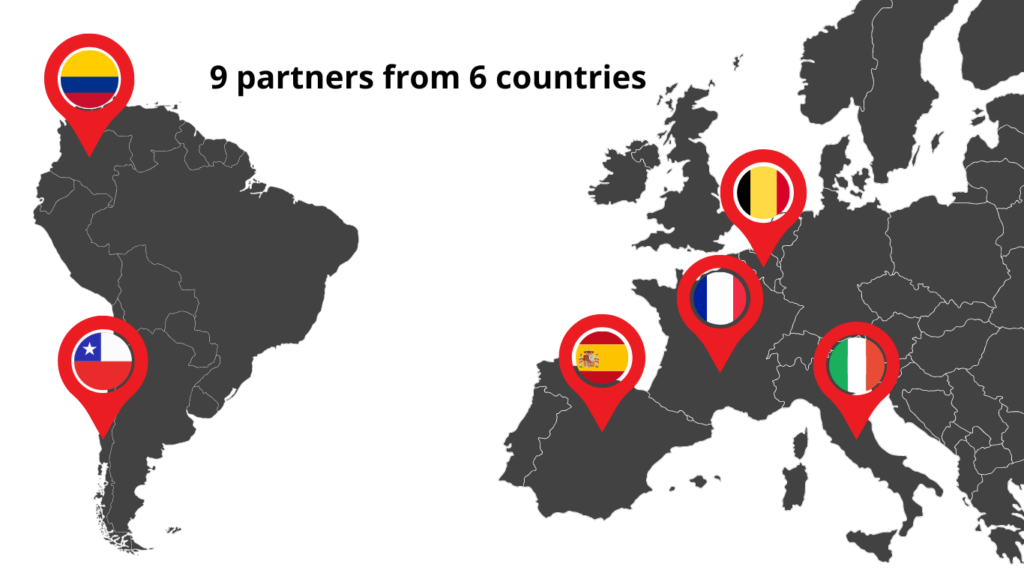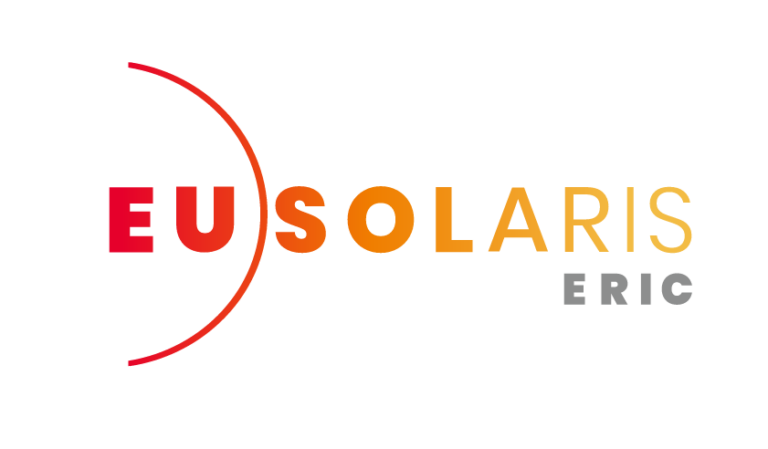About us

About the Project
CACTUS is a 2-year research and innovation project funded by the European Commission through the European Research Executive Agency (REA).
CACTUS aims to develop a bi-regional and sustainable ecosystem of complementary RIs, strengthening the knowledge and collaboration between the EU and LAC regions, by enabling the research of solar and photovoltaic technologies adapted to different climate conditions. CACTUS will contribute to the green energy transition by tackling global challenges linked to energy and climate change (both mitigation and adaptation) with the provision of R&D tools for reliable, bankable, sustainable and socially accepted solar technologies.

Some Context
73% of the global CO2 emissions are generated by the energy sector (including transport and buildings). Electrification, combined with power generation using low carbon, renewable energy sources represent a viable path to tackle climate change. In this context, solar power represents today, the cheapest energy source, but also the quickest to deploy power installations. Photovoltaic (PV) systems, in particular, have experienced exponential growth, a trend projected to persist, especially given the unpredictable and volatile nature of gas and oil markets. In an energy system, where solar photovoltaic power will represent the major energy source (potentially up to 69% of the global energy supply by 2050), the need to understand, improve and forecast the operations of PV plants becomes critical for the security and safety of the society.
CACTUS proposes to improve the research infrastructure (RI) and its portfolio of services for an enhanced solar PV performance, particularly adapted for various climate conditions (such as tropical, desert, temperate), considering the whole lifetime of PV projects, from design, installation, operations, decommissioning and End of Life. This will be achieved by linking outdoor and indoor measurements with physical parameters based on material analysis, improving algorithms for O&M, developing common data treatment procedures, assessing sustainability related aspects, while enhancing bi-regional scientific cooperation (EU-LATAM) in the renewable energy sector.
CACTUS
Project Objectives
Objective One
Improve all outdoor and indoor RI to assess the lifetime, reliability, performance & profitability of sustainable PV generation for different climate conditions.
Objective Two
Improve the portfolio of services by RI for solar and PV in different climate areas considering the whole system lifetime: design, installation, O&M, decommission, end of life.
Objective Three
Develop common data treatment protocols and assessment in view of RI improvement and services.
Objective Four
Improve the techno-economic, social and sustainable assessment of PV in different climate conditions to help define RI investment roadmaps for policy makers.
Objective Five
Enhance sustainable bi-regional cooperation (EU-LAC) in the renewable energy sector to tackle global and local climate change challenges.
Objective Six
Enhance EU-LAC scientific collaboration, joint initiatives in management and staff development in the renewables energy sector to assure sustainability in RI and research.

European Partners
Coordinator
Commissariat à l’Energie Atomique et aux Energies Alternatives
Created in 1945, the French Alternative Energies and Atomic Energy Commission (CEA) is a key player in research, tasked with guiding public decisions and providing the scientific and technical means that civil society (businesses and local authorities) needs to better manage major societal changes, such as the energy transition, digital transformation, future healthcare, defence and global security.
CEA’s LITEN institute is a CEA technological research institute specializing in energy transition technology. Its research activities focus on a number of key areas: solar power, network management, storage, including batteries, and hydrogen, geared to energy efficiency and a circular economy. Its research encompasses diverse applications in the energy generation and distribution markets, transport and industrial processes, and for the environment. On the campus of the National Institue for Solar Energy (INES) in Chambéry, CEA-LITEN’s research activities on PV technologies cover the entire value chain, from material to the complete system with a focus on the most promising technologies in terms of efficiency.
European Synchrotron Radiation Facility
The ESRF is the world’s brightest synchrotron light source. Every year, 9000 scientists from 21 partner countries and from around the world travel to Grenoble to use its extremely brilliant X-rays for leading-edge research. This fundamental and applied research contributes to addressing the complex global challenges that our society faces, such as health, energy and the environment. It also contributes to the development of new technologies for industry and to preserving humanity’s cultural heritage, lighting the way to a sustainable and peaceful future.
The force of the ESRF is its capacity to innovate, pushing the limits and seeking ever-higher performances for the benefit of the global scientific community. In 2020, the ESRF launched a brand-new generation of high-energy synchrotron, the ESRF’s Extremely Brilliant source (EBS). With the support of the ESRF’s 21 international partner countries, EBS provides scientists with new opportunities to unveil the structure of materials and the mechanisms of life, down to atomic resolution.
Institut Max Von Laue - Paul Langevin
The Institut Laue-Langevin is an international research centre at the leading edge of neutron science and technology. As the world’s flagship centre for neutron science, the ILL provides scientists with a very high flux of neutrons feeding some 40 state-of-the-art instruments, which are constantly being developed and upgraded.
As a service institute the ILL makes its facilities and expertise available to visiting scientists. Every year, about 1400 researchers from over 40 countries visit the ILL and 1000 experiments selected by a scientific review committee are performed. Research focuses primarily on fundamental science in a variety of fields: condensed matter physics, chemistry, biology, nuclear physics and materials science, etc.
Whilst some are working on battery design, fuels and catalysts, plastics and pharmaceuticals, others are looking at biological processes at cellular and molecular level. Still others may be elucidating the physics that could contribute to the electronic devices of the future. ILL can specially tailor its neutron beams to probe the fundamental processes that help to explain how our universe came into being, why it looks the way it does today and how it can sustain life.
The ILL also collaborates closely and at different levels of confidentiality with the R&D departments of industrial enterprises.
All the scientists at the ILL – chemists, physicists, biologists, crystallographers, specialists in magnetism and nuclear physics – are also experts in neutron research and technology and their combined know-how is made available to the scientific community.
ILL is funded and managed by France, Germany and the United Kingdom, in partnership with 11 other countries.
Accademia Europea Di Bolzano
Eurac Research was founded in 1992 as an association under private law with just twelve members of staff undertaking research in the areas of Language and Law, Minorities and Autonomous Regions as well as the Alpine Environment. The center gradually expanded its activities into new areas, attracted scientists from all over the world, and introduced new structures. Today, over 500 collaborators from over 35 countries conduct their research at Eurac Research.
Our research addresses the greatest challenges of the future: keeping societies healthy, fostering intact environments, promoting sustainable energy and developing well-functioning political and social systems. Seeking answers through interaction between a variety of disciplines, we develop concrete solutions for regional problems which can then be applied globally. We continually strive to open new paths with science and innovation, by responding to society’s complex questions with answers geared to the needs of people.
Fundación Tecnalia Research & Innovation
TECNALIA is the largest center of applied research and technological development in Spain, a benchmark in Europe and a member of the Basque Research and Technology Alliance. We collaborate with companies and institutions to improve their competitiveness, people’s quality of life and achieve sustainable growth. We do it thanks to people who are passionate about technology and committed to building a better society.
Our mission is to transform technological research into prosperity.
Our vision is to be agents of transformation of companies and society for their adaptation to the challenges of a changing future.
We work with an increasingly strategic business relationship model based on trust, collaboration, and a shared technological approach, whereby our main scopes of action are: smart manufacturing, digital transformation, energy transition, sustainable mobility, health and food, urban ecosystem and circular economy.
We are the first private Spanish organisation in contracting, participation, and leadership in the European Commission’s Horizon Europe programme and we are ranked fourth in European patent applications.
Leader of activity on New Services (WP3), coordinating the creation of new services from improved RI with commercial potential, the enhancement of PV plant profitability and sustainability through open sources tools and finally the creation of datasets for indoor/outdoor models’ calibration for specific climates.
Leader of activity in Tools for PV plants O&M. TECNALIA will check the tools based on enhanced RI datasets obtained during the project and then improve them for the different selected locations. TECNALIA will also contribute to the generation of suitable datasets for validation of theses SW tools and will enhance the PV plants failures assessment, putting in place its own methodology for Failure Detection and Diagnosis, adapted to harsh working conditions (proof of concept of the tool).
ICARES Consulting - Becquerel Institute
The Becquerel Institute was founded in 2014, it combines the strength of a consultancy company with a dedicated research activity focusing on the ecosystem of solar photovoltaics. Its expertise is: applied research and strategic consultancy. In the CACTUS project, the Becquerel Institute is leading the communication, dissemination and exploitation work. The combination of the Becquerel Institute’s ties to national PV associations in various EU countries, APVIA in Asia, Solar Power Europe, Solar United, the European Solar Manufacturing Council ESMC and the ETIP-PV; its participation in various EU-funded projects; and its knowledge of the PV market and applications sector strengthens the competences of this project.
European Solar Research Infrastructure For Concentrated Solar Power
A European Research Infrastructure Consortium (ERIC) is created, under the name of “European Solar Research Infrastructure for Concentrated Solar Power” (hereinafter, “EU-SOLARIS ERIC”), pursuant to the provisions of Council Regulation (EC) Nº 723/2009, of 25 June 2009, on the Community legal framework for a European Research Infrastructure (hereinafter “the ERIC Regulation”).
EU-SOLARIS ERIC shall establish and operate a world-class distributed research infrastructure on concentrated solar power/solar thermal energy (CSP/STE) to be set up as a central hub responsible for the coordinated operation of national research centres in CSP/STE technologies, which shall dedicate part of their research and development capacities to EU-SOLARIS ERIC, sharing contents, tools and know-how related to CSP/STE technologies.
Solar thermal technologies share many of the issues that PV is facing when operating in harsh, desert climates. EU-SOLARIS ERIC will contribute the knowledge and technical capabilities of its partners to the achievement of the CACTUS consortium’ goals.
Latin American Partners
Corporación ATAMOS TEC
ATAMOSTEC is a consortium formed by 5 Chilean universities, industrial partners, CEA (France), and ISC Konstanz, which seeks to develop bifacial module technologies specially adapted to Desert and high radiation
conditions. ATAMOSTEC (Atacama Modules and Systems Technologies), brings to CACTUS sound Desert characterization and PV module degradation data, O&M strategies, and knowledge created by several projects developed in Chile in collaboration with an extensive network of partners from the private and public sector.
Universidad Nacional de Colombia
The UNC (Universidad Nacional de Colombia) has several PV installation facilities on six different campuses (Medellin, San Andres, Bogotá, La Paz, and Leticia), which are monitored continuously. The data is collected and
shared for research purposes. Also, information on weather conditions is available from national and local instruments (humidity and temperature mainly). The UNC will contribute to CACTUS with information on PV performance, degradation and optimization knowledge, specific to tropical conditions.








